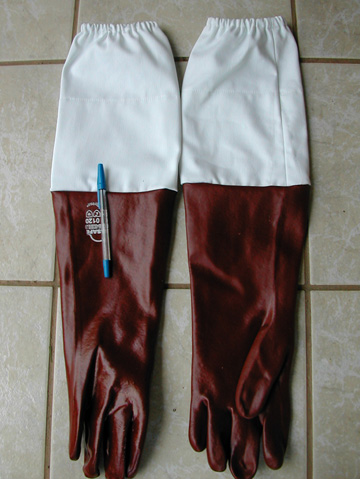|

Beekeeping is a comparatively low investment activity which requires only beehives, protective clothing and a few simple tools. It is also a truly sustainable agricultural activity.
Author: Dominique Marchand, Jenny Marchand-Mayne
ISBN: 0958478570
Book specifications: Soft cover, 240 x 168 mm, 192 pages
|
Beekeeping - A Practical Guide
BeeWare would like to introduce a practical guide book for all hobby or beginner beekeepers. Our Practical Beekeeping - A Beginner's Guide is now also available as an ebook.
Beekeeping - A practical guide for
southern Africa
(2nd edition) is also available is a soft cover bee book written by a South African beekeeper operating in the Cape. Call us : 081 426 4333
Welcome To Our Suggested Reading section |
Beekeeping is a comparatively low investment activity which requires only beehives, protective clothing and a few simple tools. It is also a truly sustainable agricultural activity. The honeybee is a natural resource, land ownership is unnecessary and there is no daily routine of feeding, watering and medicating. Along with the reward of a crop of honey and other useful hive products, the finest fruit, vegetables and seed result from bee pollination.
This book is dedicated to the Bushman people, the first people of southern Africa, who have sustained their relationship with the honeybee for thousands of years. Each chapter ends with a story or legend which reflects this relationship.
Beekeeping: A practical guide for southern Africa is designed to:
- encourage and inspire potential beekeepers (hobbyists, rural people, farmworkers and entrepreneurs setting up small business initiatives),
- provide support for commercial beekeepers and their employees,
- satisfy the curiosity of anyone fascinated by the organised society of the honeybee, and
- provide a store of useful data on bees and beekeeping, seasoned with a blend of interesting information and folklore.
John Phipps, editor of two international magazines for beekeepers (Beekeeper's Quarterly and Bee Biz) had this to say about the book:
'I am impressed by the breadth of this book as it covers the management of the two species of honeybee and their keeping in conventional and top bar hives. Indeed, not only does the book cover anything that the beekeeper is likely to need by way of information, but the detail is especially excellent regarding the practical side of apiary work - the contents of the tool box, the examining of colonies and special jobs like queen rearing, swarming control, honey removal, etc. I like the fact that whether beekeepers are working in a traditional, rural way, as hobbyists, or in commercial enterprises, their needs are fully met. The section on the transferring of wild colonies to hives is the most detailed and clear description of the process that I have ever come across. Apitherapy, planning and records, forage sources, biology ... everything is there and the diagrams complement the text really well.
'In addition to all of the above are the delightfully illustrated anecdotes of traditional beekeeping. The authors have packed a lot in what actually seems, at first glance, to be a relatively small book.'
Contents: R360 per copy.
- The honeybee in nature
- About the honeybee
- Beekeeping kit and tools

- Bee
- Beehives
- Beginning beekeeping
- Hive management
- Feeding bees
- Special management
- Queen rearing
- Bee plants
- Honey
- Supering and harvesting honey
- Honey extraction
- Costing and marketing honey
- Other hive products and their use
- Beeswax
- Pollination
- Rural beeeeping
- Pests, diseases and other problems
[Bee Gloves] [Bee suits] [Hive Tools] [Hives*] [Smokers] [Blue book]
[Wax foundation sheets] [Queen cages] [Bee brushes] [Honey knife] [Extractors]
** Call to discuss your needs. Go to Contact Us!
|
| Becoming Protected - Use gloves |
Generally, beeekeepers use gloves every time they are at the apiary. You can do an external inspection of a hive which does not require any gear however this is only recommended once you have gained confidence in handling bees and with the appropriate precautions.
|
| Which Gloves? |
 For work with bees which requires a finer tactile control then a leather glove is recommended. Usually used when working with the queen or planning queen-rearing exercises. From R150 a pair For work with bees which requires a finer tactile control then a leather glove is recommended. Usually used when working with the queen or planning queen-rearing exercises. From R150 a pair
A pic is not yet available.
 Inner Gloves worn inside the PVC glove offer slightly added protection as well as helping to keep sweating down. Inner Gloves worn inside the PVC glove offer slightly added protection as well as helping to keep sweating down.
 Place your order for 'THE' book on beekeeping also known as the Blue Book titled Beekeeping in South Africa. Click on order for more info. Place your order for 'THE' book on beekeeping also known as the Blue Book titled Beekeeping in South Africa. Click on order for more info.
|
|
 Just about any work with bees and the hive can be done using PVC gloves. As mentioned above, it comes down to preference in most instances. One may also like to use inner gloves with these as the pvc tends to make your hands sweat and smell of rubber. From R130 a pair Just about any work with bees and the hive can be done using PVC gloves. As mentioned above, it comes down to preference in most instances. One may also like to use inner gloves with these as the pvc tends to make your hands sweat and smell of rubber. From R130 a pair

 Get the beekeeping equipment. Essential equipment is available from our office in Centurion. Hives, hive tool, protective clothing & smoker make up the need-to-have list. Click here Get the beekeeping equipment. Essential equipment is available from our office in Centurion. Hives, hive tool, protective clothing & smoker make up the need-to-have list. Click here
|
|
|
|
|